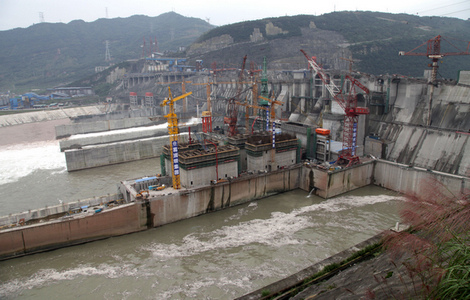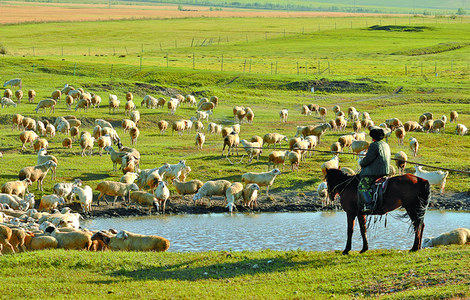Overfishing depleting sea resources
Updated: 2013-02-21 03:53
By AN BAIJIE and XU WEI in Rizhao, Shandong (China Daily)
|
||||||||
Deteriorating fish stocks off the coast of East China's Shandong province are forcing fishermen to travel increasingly farther from the shore.
"About a decade ago, we could catch lots of fish after traveling about 90 nautical miles away from land, but now we have to go as far as 130 to 160 nautical miles," said Hou Jiwei, from Wulian county, Shandong province.
Hou has been a fisherman for 16 years.
Around a decade ago, Hou and his colleagues could catch about 5 to 6 metric tons of fish every two weeks, but now they can only net a quarter of that.
According to Special Project 908, an investigation into aquatic resources by the State Oceanic Administration that concluded in October, fishing resources along the coastal waters of the Chinese mainland are in decline.
The investigation found that the winter waters of fish with commercial value are moving closer to the coast and feeding sources for juvenile fish have decreased.
A study by Tianjin Bohai Sea Marine Products Institute in July 2011 also showed that the types of marine products with commercial value decreased from 70 to 10 in recent years.
Working for a private fishery company in Qingdao, Hou said he has spent more time on his boat in recent years because of difficulties in catching fish.
"In the past, we would return to the harbor after fishing in the sea for two weeks. But now, every fishing trip will last at least a month, and sometimes more than two months," he said.
Pollution and land reclamation are the major causes of the depleted fish stocks as they both destroyed the spawning sites of fish stocks, which are generally located in shallow waters, according to Song Weiyan, an aquaculture researcher at Rizhao Polytechnic.
Meanwhile, overfishing and using fishing nets with smaller holes than required, also contribute to depleted fish stocks.
"Other countries, such as South Korea and Japan, generally have strict limits on the size of fishing net holes used by fishing boats. However, the regulation is generally lax in Chinese waters," he said.
Almost every fishing boat is now equipped with fish-detecting devices, which also contributes to rampant overfishing.
"About 10 years ago when you put a bucket into the sea, you could probably catch three fish. Five years ago, you could catch maybe one or two. Now you barely stand a chance of catching any," said Gao Yuefei, owner of a fishing boat in Rizhao.
Meanwhile, with the cost of diesel rising from about 2,000 yuan ($320) per ton to 8,000 yuan per ton over the past 10 years and the wages of workers on the boat also rising, Gao said intensive fishing seems like the only option.
"We will certainly suffer losses if we use the previous methods. If previously we could trawl 100 times, now we need to trawl 120 times to make ends meet," he said.
"Sometimes the fishing boat owners earn less than their employees," he added.
Hou Jiwei, the fisherman, said he could earn an average of 70,000 yuan a year, but his boss sometimes earned less than 30,000 yuan.
The drive for profit has not only pushed fishermen farther out to sea, it has also brought them into conflict with South Korean coast guards in the Yellow Sea.
Coast guards from South Korea captured or sent back more than 470 Chinese fishing ships in 2011 on allegations of having crossed into South Korean waters in search of seafood in local waters, Seoul-based Yonhap News Agency reported.
Gao said fishing boats travel close to South Korean waters in October and November, due to stormy weather in those months.
"We would generally try our luck in winds between force 8 and 10 on the Beaufort scale. The big wind and waves make it difficult for South Korean boats to get near," he said.
However, penalties are high for those who are caught.
"The South Korean coast guards fine us 300,000 yuan and the Chinese authorities will also revoke our diesel subsidy of 100,000 yuan as punishment," said Hou.
Other options
Liu Qinghai, from Yantai in Shandong, gave up fishing five years ago when profits started to decline and turned to breeding shrimps instead.
"It seems our only option with the high diesel price and employment costs," he said.
Even with aquaculture, ocean pollution is a big issue that must be dealt with.
Jiao Jiande, who has raised oysters in coastal waters in Rizhao for more than 20 years, said fishermen are now forced to raise ocean species that are more adaptable to the outside environment.
Jiao, who started farming fish in the early 1990s, said pollution clearly took its toll on fish farms across the city.
"About 20 years ago, scallops could be raised in all the coastal waters in Rizhao. We were forced to switch to raising oysters 10 years ago after all the scallops we raised died," he said.
Compared with scallops, which are more sensitive to pollution and changes in water temperature, oysters are more adaptable to the outside environment.
Jiao said the city's port construction and development of the steel industry has caused severe pollution in coastal waters, and the pollutants make the water less nutritious and the water temperature more changeable.
Even with the oysters he raised, they failed to fatten up, despite all efforts, he said.
As for Hou, the more than 70,000 yuan annual income the sea provides is no longer an attraction to him, and he is considering completely dropping the trade.
"I spent 120 days on my boat during a fishing trip last year, and you can image how boring it was to stay on a 20-meter long boat all day and night," he said.
"My son is 4 years old and I missed him very much when I was on the boat," he said. "When he grows up, I will tell him not to become a fisherman."
Contact the writers at anbaijie@chinadaily.com.cn and xuwei@chinadaily.com.cn











